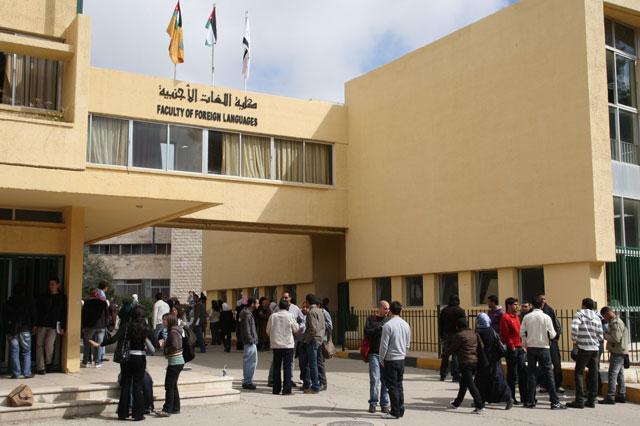You are here
2016 executive plan to further boost public sector productivity — Khawaldeh
By Omar Obeidat - Nov 24,2015 - Last updated at Nov 24,2015
AMMAN – The Public Sector Development Ministry has prepared the 2016 executive plan to improve the efficiency of government agencies that focuses on human resources, fair distribution of services and accountability, Minister Khleef Al Khawaldeh said on Monday.
The government has made tangible progress over the past years in enhancing the quality of services offered to the public and businesses, he added in an interview with The Jordan Times, but acknowledged that more work is still required to boost public sector productivity.
The plan mainly focuses on establishing a positive culture of work and expanding projects and activities targeting the development of public service to the governorates, Khawaldeh said, noting that the 2016 strategy includes a number of new projects that translate Royal directives to enhance the quality of services and simplify procedures for the public and investors.
New projects
For example, one new project entails developing working mechanisms of committees in charge of issuing approvals and licences for businesses and also seeks to identify ways to improve the efficiency of their work to further facilitate services and simplify procedures, the minister said.
Another project will study the geographical distribution of centres providing government services to evaluate its effectiveness and fairness.
"People in remote areas and villages would not consider resorting to government e-services if they live far away from such centres… To enable them to access public services, a building offering key services can be established in each area," he explained.
Khawaldeh said an interactive observatory will be launched for citizens to evaluate government services and offer their ideas and suggestions for developing them.
Performance evaluation
The minister noted that the government has issued a bylaw to govern the appointment of senior officials to ensure integrity, transparency, justice, equal opportunities and the recruitment of qualified candidates.
However, Khawaldeh said those in leadership positions, such as secretaries general of ministries and directors of government agencies, should be assessed on a periodic basis to achieve better performance.
For this purpose, he added, the ministry has prepared a performance evaluation system for senior employees based on measurable standards and indicators that guarantee accountability and professionalism.
The evaluation system, which the Cabinet approved earlier this month, includes four pillars: institutional, financial, observations and results of excellence awards.
The institutional performance includes the level of achieving and enhancing objectives over the years, while the financial pillar includes controlling current expenditure and increasing revenues for income-generating departments, Khawaldeh explained.
Comments in reports issued by monitoring agencies constitute the third pillar, while the fourth entails evaluating results of excellence awards, including the King Abdullah II Awards for Excellence in Government Performance and Transparency, in addition to the level of customers’ satisfaction.
The evaluation system will be implemented at the end of every year and senior officials should also submit a semi-annual achievement report, he said.
The results of the evaluation process will be used as a reference when taking decisions on whether or not to keep the senior officials in their positions.
Retirement age employees
Khawaldeh said the Cabinet also approved a set of standards to be considered before a decision is taken to extend the services of employees who reach retirement age, under which the concerned department should justify its need for the employee in terms of practical expertise, skills, and shortage in his/her specialisation.
These criteria aim to limit the process of extension and give graduates the opportunity to apply for vacancies, he noted, adding that they also seek to limit expansion in government size as the public sector employs more than 10,000 people annually, while the number of retirees is much lower.
“Another reason is to give those who apply at the Civil Service Bureau the opportunity to be recruited, and hence lessen unemployment that has a negative social impact.”
Annual contracts and top university achievers
The minister noted that since the beginning of 2014, the government started recruiting employees under annual contracts that are renewed according to the employee’s performance as it aims to enhance public sector productivity and entrench a positive work culture.
“Working for the government is no longer a secure job... Instead an employee can keep his/her job only by being productive and efficient.”
In order to deepen the culture of excellence and innovation in government departments, the Cabinet recently approved the recruitment of 150 top graduates from public universities every year, according to Khawaldeh.
Those who have graduated during the last three years in the fields of engineering, business administration, information technology and law will be recruited under the first phase, while the rest of specialisations will be gradually included during the upcoming phases as per the requirements of government departments, he noted.
The purpose is not only to hire them, Khawaldeh said, but to foster their capabilities by providing an appropriate environment.
“We have plans to put a certain percentage for hiring top graduates in annual government vacancies by modifying selection and hiring regulations,” he added.
Cooperation with int’l agencies
Due to limited finances and budget constraints, the ministry implements programmes and projects using its staff without contracting consultancy firms, Khawaldeh said, adding that it also benefits from grants and expertise offered by supportive international agencies.
He cited cooperation with USAID, which provided the ministry with technical support to implement the “empowering women in the civil service sector” project.
So far this year, 180 women benefited from this programme, which will continue next year.
The ministry is also coordinating with USAID to receive more support to implement a number of programmes and activities included in the executive plan for the upcoming years.
In addition, the ministry has started, in cooperation with UNDP, preparing a policy paper on public administration reform with the aim of increasing its effectiveness, efficiency and capacity to confront national challenges according to the status quo and international comparative studies.
Moreover, the European Union, in coordination with the Ministry of Planning and International Cooperation, will provide the ministry with technical support through the “Support to Public Finance and Public Administration Reforms” programme.
The support includes developing the interactive observatory to evaluate government services and measure customer satisfaction, which is scheduled to start operating during the first quarter of next year.
Related Articles
AMMAN – The Cabinet on Wednesday approved the recruitment of 150 top university achievers in government departments, a move described by Min
AMMAN — The Cabinet on Tuesday endorsed the Ministry of Public Sector Development’s recommendations to reinforce the role of top university
The Ministry of Public Sector Development is preparing plans to attract top best achieving university students in certain fields to work for government agencies.














